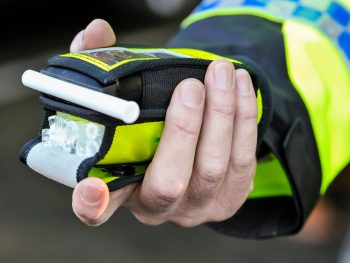Breath tests slump to lowest level for 18 years
The number of roadside breath tests has reached its lowest level since 2002, reflecting the huge reduction in the number of dedicated traffic officers on the roads.

Breath tests are now at their lowest level in 18 years
Newly published Home Office data shows that in 2019 only 302,281 motorists were breathalysed by the police – just 43% of the number of tests carried out 10 years ago and an 11% decrease on 2018.
Yet, despite the slump in tests, 16% of drivers were over the limit – the highest proportion since 2007.
The figures have left road and safety organisations reiterating the need for increased police presence on the roads. According to a recent report by PACTS, there was an 18% reduction in the number of dedicated roads policing officers in England and Wales between 2015 and 2019.
Hunter Abbott, managing director of breathalyser firm AlcoSense and a member of PACTS, said: “With several studies showing people drinking more alcohol since Covid struck, roadside tests should now be stepped up.
“But without more traffic police, testing will continue to spiral downwards.
“The latest government figures show 8,860 people killed or injured on the roads due to drink driving. There’s a direct correlation between the increase in casualties and the decrease in law enforcement.”
AA president Edmund King also said the figures highlight the massive reduction in the number of specialist traffic officers on our roads.
“While cameras are a useful tool in helping police our roads, we cannot solely rely on them. A camera cannot stop a drink driver, or pull over someone driving carelessly, so having more cops in cars will help eliminate poor and dangerous driving.
“The lack of roads police has led to drivers thinking they can get away with certain offences. More than two-thirds (69%) say it is unlikely they would be caught driving carelessly where they live, while two-fifths (43%) say they could drive without insurance and feel they wouldn’t be caught.”
King added that the AA believes we should set a target of zero road deaths by the end of the decade, and can only reach that if a significant effort is made to meet that ambition.
“As well as more police, we’d like to see more road safety campaigns and road safety made part of the national curriculum in order to eliminate the levels of driver complacency,” he added.
As well as the breath test figures, the new government data shows more than 2.2 million speeding fines were issued to drivers last year – an increase of 7.8% compared to 2018. Police also targeted careless driving and car occupants not wearing a seatbelt, which have significantly increased between 2018 and 2019 (up 33.5% and 84.3% respectively).
By contrast, the number of fines issued for using a handheld mobile phone dropped by more than a quarter (26.5%).
The AA’s Edmund King continued: “We are pleased that a significant effort has been made to tackle people not wearing a seatbelt, as a distressingly high proportion of car occupants killed in collisions were found not to be wearing one.
“Likewise, the use of covert HGVs is a contributory factor in the reduction of people using a hand held mobile phone behind the wheel. The recent announcement to close the loopholes around mobile phone use while driving will help too.”












